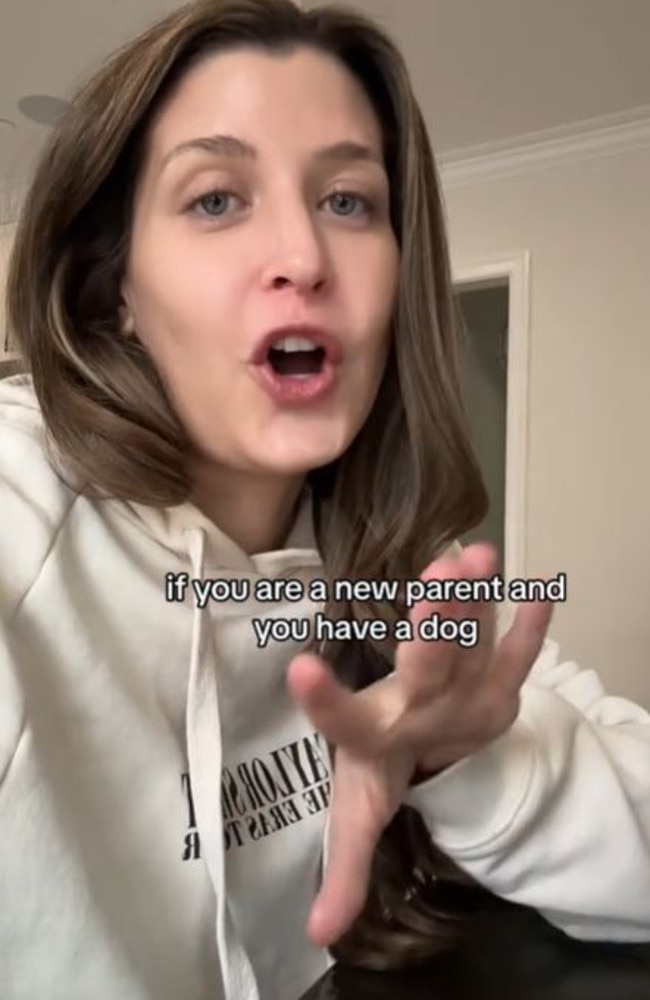Aussie expert’s advice for new parents hit by ‘pet resentment’
A “heartbreaking” phenomenon that affects new parents has been exposed on social media – prompting an Aussie expert to issue advice.
A “heartbreaking” phenomenon affecting new parents has been exposed on social media — prompting experts to issue advice for struggling mums and dads.
Parents, particularly mothers, have opened up about the “guilt” they feel after welcoming their baby and realising they don’t have as much time to dedicate to their pets.
Dubbed “pet resentment”, some struggle more than others, with parents who were feeling particularly overwhelmed by their new job as a caregiver expressing they even feel anger at times towards their pets.
Everyone detailing their experience said they “adored” their pets, but said something inexplicably shifted, with many desperately looking for ways to alleviate the situation.
Why are new parents feeling differently towards their pets?
Chelsea Seddon, head trainer of Petbarn’s Pet Academy and Obedience in NSW, ACT and South Australia, told news.com.au “it’s not uncommon” – and shared a series of tips to help new parents overcome their new-found circumstances.
“The arrival of a new baby is a big shift in any household. It can take time to adjust to a new routine for taking care of a baby on top of caring for a pet,” Ms Seddon said.
“It’s important to remember that pets respond in the moment to the environment around them,” she said.
“Owners might see behaviours emerge that they find less desirable, but these behaviour changes are the pet’s attempts to cope with a new routine and the presence of a new baby. The pet is never ‘misbehaving’ on purpose.”
Holly Kingston, who met her husband Jimmy Nicholson on popular reality dating television show The Bachelor, recently shared a video which touched on the topic after announcing the pair were expecting their first child.

In the clip, Jimmy was seen breaking the news of their impending baby to their cat, Raffy.
“I can’t reverse it, it’s already in there,” he told the white feline in the TikTok video.
“I know it’s upsetting but you’ll be number four.”
Social media users had a strong reaction to the pilot’s words which acknowledged the cat’s place in the family had been pushed to last position.
“He can’t be number four!” one follower said.
“Kitty said, ‘I’m an only child’”, another noted.
While another asked: “Why would you do that?”
Another simply stated: “This is heartbreaking.”
Others have also opened up on social media about the unexpected way their feelings towards the family pet changed post-birth.
“The resentment I have towards my pets ever since I gave birth is insane. I love them to death but the level of anger these animals bring me is insane,” one social media user said.
Another said it’s been close to four years and the resentment felt towards their cat is only now beginning to disappear.

Katie Beach, an American woman who posts about parenting and lifestyle, also discussed it.
“If you are a new parent and you have a dog and you’re experiencing horrible dog parent guilt cause you feel like none of your attentions going to them, you don’t have the energy for them,” she said.
“I just want to let you know my son is now one-and-a-half and I’ve been able to sit here just drinking my coffee because they’re playing together.
“He keeps throwing the ball to her, they have a great time. He’s using his energy, she’s having a great time. It gets so much better because they just have a miniature best friend on the way — they just need to get a little bit older.”

Another said: “I’ve been seeing posts about ‘pet resentment’ after having a baby and honestly I don’t get this,” the woman said.
“This little man loves me so much and is always by my side. As a soon-to-be mum I could never imagine betraying his trust and love by resenting him when all he wants is to be near his person.”
Ms Seddon advises any pet parent who has welcomed a new child into their home to be aware of the signs your pet may be feeling a shift in attention.
For dogs, signs include panting for no reason, avoiding eye contact and a tucked tail while in cats it includes a change in grooming habits and not using the litter tray to go to the bathroom.

How to avoid ‘pet resentment’ in your home
Ms Seddon said it’s important to try and maintain your pre-baby schedule.
“Try to feed and exercise your pet at the same times, and ensure your pet has a safe and comfortable place to rest and sleep away from the baby,” she said.
“Do your best to set aside some dedicated time in your daily routine to play and interact with your pet without your baby present. If spare time is scarce, consider asking friends or family over to play with your pet. They can also help with the baby so you can spend some valuable time alone with your pet.”
She also suggested ways to create a strong relationship between the parent, pet and newborn including preparing your pet before the baby arrives by setting boundaries like taking the dog for a walk with an empty pram.
She also said you shouldn’t introduce your baby to your pet on day one.
“Familiarise your pet with your baby’s scent first by letting them smell your baby’s clothing and blanket,” she said.
“When your pet and baby do meet face-to-face, give your pet plenty of space to observe from a distance and reward them gently for calm behaviour.”






